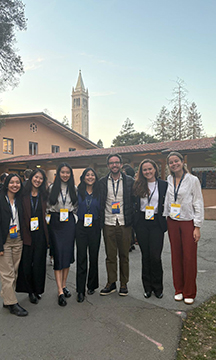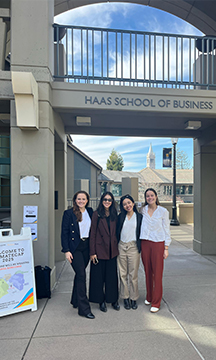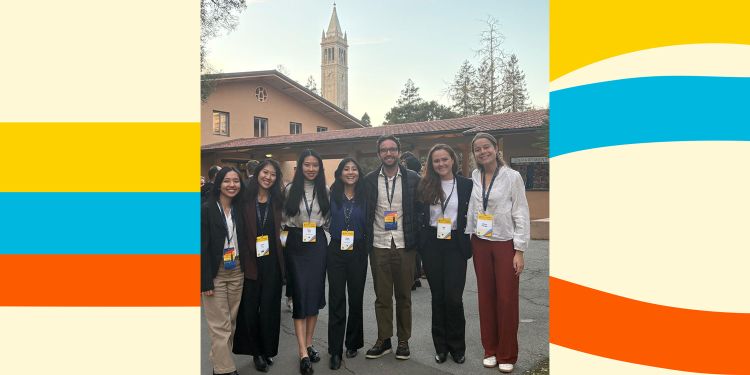ClimateCAP is an initiative manage by Duke University’s Fuqua School of Business whose mission is to prepare business leaders to understand and respond to the climate challenge. They provide learning resources for MBA students interested in the intersection of business and climate. Each year, ClimateCAP hosts a summit, which brings together MBA students, business leaders, and experts from around the world to assess the implications of climate change for business. This year the summit took place at UC Berkeley, and we heard from students that were sponsored by BEI to attend about what made the biggest impression during the summit:

"Attending the ClimateCAP 2024 conference was an energizing experience that reinforced my commitment to sustainability. I had the opportunity to connect with MBA students from diverse backgrounds, all passionate about tackling climate challenges from different angles - whether in energy, finance, supply chains, or consumer goods. Engaging in these discussions and networking with professionals, some of whom generously offered to continue the conversation beyond the conference, was truly inspiring. As someone passionate about consumer sustainability, I found the "Levers of Change: Orchestrating Food Systems Transformations" and "Threads of Change: Sustainable Solutions in Apparel and Textiles" panels especially thought-provoking. A key insight that stuck with me is how disconnected we often are from the origins of the food we eat and the fibers we wear. Recognizing that our daily consumption choices have environmental consequences is crucial - each of us has a role to play in fostering more regenerative and responsible production and consumption systems" - Connie Chan (MBA 2026)
"ClimateCAP was a great way to connect with MBA students who share a passion for climate and business. As someone interested in food and ag, I especially enjoyed a panel with an agri-tech entrepreneur and two investors, where they shared honest insights on the challenges of growing a climate startup - how to navigate the ‘valley of death’ and build the right funding mix. Another highlight was the closing reception on the rooftop of Berkeley’s stadium. As the sun set over San Francisco, it was great to connect with MBAs working in climate tech and sustainability and learn about their experiences." -Olivia Dejonghe (MBA 2026)
"The summit was a great experience that provided me with deeper insights into the intersection of climate, finance, policy, and technology. I really enjoyed connecting with a diverse range of MBA students from across the country, having dinner on top of the Cal Memorial Stadium with a beautiful sunset view. One of my favorite panels was "Climate Risk: Are we headed into an uninsurable future?" which was a conversation around the role of insurance in climate adaptation, and key innovations such as nature-based solutions that mitigate losses before disasters strike." - Anna Kim (MBA 2026)
"I came into the second semester feeling a bit overwhelmed. With the new administration taking office, there has been immense uncertainty for all industries and organizations working toward climate goals. Going into ClimateCAP, I was pleasantly surprised at how re-energizing the experience was. It was really nice to sit with folks from schools across the US and Europe and have some thoughtful discussions about how we'll all fit into the changing landscape. I was pleased that the conference focused so much on Food & Ag and included an urban farm tour of Oxford Tract Farm in Berkeley and a panel of leaders in sustainable food systems including Alice Waters of Chez Panisse and the Edible Schoolyard Project. The overwhelming sentiment was that consumer focus on nutrition and sustainability in food is only growing, and sustainable farming and land management practices will continue to grow in importance as the climate is changing. On the policy side, things were a bit bleaker. California is staying committed to their climate goals, but combatting climate change requires coordinated efforts to make meaningful strides and coordination is becoming more challenging. Regardless of the challenges, I was inspired by the messages of leaders who have been in the space for decades, reminding the hundreds of future leaders in attendance that regardless of the political landscape, this movement has been growing for decades and has gained significant support, so we just need to keep on this long march toward a more sustainable and just world." - Brian Youngblood (MBA 2026)
"Attending the 2025 MBA ClimateCAP Summit deeply reinforced my conviction that climate-tech investing demands both patient capital and a systems-thinking approach to rapidly and equitably scale solutions. Over the course of insightful panels and workshops—covering everything from “Valley of Death” funding gaps to the ways policy can unlock private capital—I saw how blending public, private, and philanthropic financing is critical to bridging early-stage innovation with commercial deployment. Even more striking was the emphasis on corporate partnerships as catalysts for first-of-a-kind deployments, as well as the vital importance of specialized investors who understand the unique risks, timelines, and technological complexities inherent to climate tech. Overall, the summit underscored that the energy transition hinges on concerted collaboration among investors, startups, and policymakers, each leveraging their expertise to push bold innovations forward and ultimately reshape entire industries toward a more sustainable future." - Shashwat Shivam (MBA 2025)

In addition to the summit, each year ClimateCAP selects a handful of MBA Fellows. The ClimateCAP MBA Fellowship is an immersive cohort-based experience for MBA students that enables and empowers them to become the next generation of climate leaders. Over the course of 12 months, they are exposed to a variety of climate topics, expand their networks, and develop real-world climate experience. We caught up with Gaby Co Seteng (MBA 2026, 2025 ClimateCAP Fellow), Mary Chen (MBA 2026, 2025 ClimateCAP Fellow), and Ian Naccarella (MBA 2025, 2024 ClimateCAP Fellow) who are part of the MBA Fellowship to learn about their dedication to climate change and how the fellowship has supported their work:
Tell us a little about your background and what your interest in climate-related issues is.
I've been in renewable energy project development for the past few years, focusing on how to deploy clean infrastructure. Recently, I've been exploring adaptation and preparedness solutions for climate risk and hoping to apply my learnings building a more resilient built environment. - Gaby Co Seteng
I'm specifically interested in energy and utilities. One of my favorite projects as a consultant was for a utility that was seeing unprecedented load growth and needed to determine what investments to make in the grid to support more renewables and higher energy demand. That experience, along with my interest in impact investing from undergrad led me to a role in impact investing prior to HBS. - Mary Chen
I've been interested in climate tech since high school, where I had a great chemistry teacher that talked about how batteries and solar panels worked, which is where my interest started. I pursued chemical engineering for my undergraduate and master's degrees, with a focus on clean tech. I did consulting in the climate sustainability practice area of BCG, which got me interested in technology innovation out of the lab and commercializing new breakthroughs. I went to a battery startup to do that, which led me to HBS with the focus of trying to do climate tech entrepreneurship. - Ian Naccarella
What inspired you to apply for the ClimateCAP Fellowship?
I'm most excited to collaborate with a cohort of similarly passionate and talented MBA students who are dedicated to working on the climate challenge. - Gaby Co Seteng
I really appreciate how the ClimateCAP fellowship is focused on supporting a cohort of students all interested in the space, but pursuing different problems and solutions. I'm hoping to use my time at HBS to build a deeper understanding of the energy sector, so the opportunity to work on a specific project of my choosing, with the support of tailored resources and programming was exciting to me! - Mary Chen
I liked the community aspect where you're working with other 1st year MBA students. The conference was a great opportunity to meet everyone in at the start of the fellowship and I also liked the support and framework that they offered around pursuing projects that most of the fellows were already interested in. I was going to pursue climate entrepreneurship anyway, but the fellowship provided the resources, community, and structure to push me to get things done. The marketing arm of ClimateCAP was also particularly good, they were able to amplify the work and help get traction. - Ian Naccarella
Tell us more about the project you’ll be working on during the ClimateCAP Fellowship. What is it and what impact do you hope to have?
My final project is still in flux, but at the moment, I'm researching flood mitigation strategies, using both green and grey infrastructure, as well as improving risk modeling and investing in solutions. - Gaby Co Seteng
My ClimateCAP project is focused on the "missing middle" of climate funding, where Series B+ companies often have trouble raising capital because their risk return profile may not be suitable for traditional private equity or infrastructure investors. Many of these companies may be working on solutions with significant decarbonization potential, but are more capital intensive or have technology risk that later stage investors are unwilling to bear. I'm hoping to find creative solutions for investors and companies within the sector. - Mary Chen
My plan from the beginning was to find an exciting technology and form a company in that space. I pivoted about midway through the fellowship, my initial idea was solar geoengineering. The original idea was studying how to scatter aerosols into the upper atmosphere of the earth to reflect sunlight and cool down the planet. I pivoted to what I'm working on now, which is midstream hydrogen transport. I did an overview of the different options for transporting hydrogen molecules around; what is the market opportunity; I talked to a bunch of different customers, and now I’m working to figure out the commercial validation for this specific technology. - Ian Naccarella
What are you most looking forward to as a ClimateCAP Fellow? What were the benefits to being a fellow?
Diving into the project and research! The MBA program can be hectic and busy, so I value the dedicated time and structure to pursue my interests and stay focused on climate adaptation problems. - Gaby Co Seteng
I'm most looking forward to conducting primary research in the space, and speaking to academics, investors, and companies on their views of the issue. It was also exciting to meet the other fellows at the ClimateCAP conference! - Mary Chen
The kickoff weekend at the ClimateCAP Conference where you got to meet all the different fellows and were introduced to different speakers was an awesome way to get ingrained into the broader climate community. The continuing support from the other fellows has been really helpful- as folks come up with questions along the way, it was really helpful to have a dialogue on an ongoing basis. They also brought in speakers who gave excellent presentations and were helpful to hear from. The structure and framework around producing a deliverable also helps to set a timeline. When you're tackling a big project, timelines can stretch but the fellowship had a limited duration, so it was helpful to have these interim check-ins to make sure that you're on track. - Ian Naccarella

